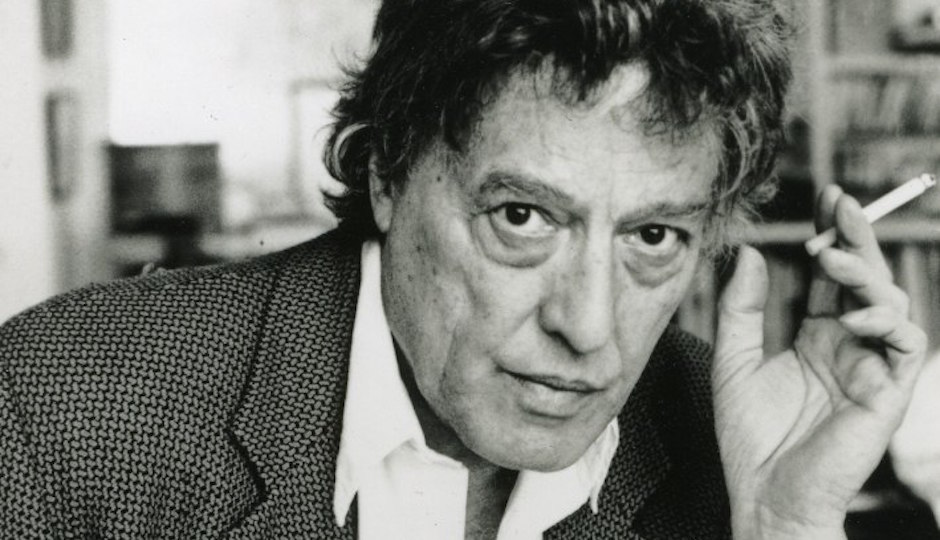My 30 Minutes With Tom Stoppard
I go into my interview with Oscar and Tony-winning British playwright Tom Stoppard with a laundry list of questions, but I quickly forget all about them once I sit down across from him. He’s in town for a Q&A with world-renowned cognitive scientist David Chalmers at Wilma Theater — a venue that has become something of Stoppard’s East Coast home — about his newest work, The Hard Problem, which opens soon at the Wilma.
“Are you going to stick around for this, this thing tonight?” he asks.
“Yes. I’m pretty excited about it.”
“You’re excited about it?” he responds sarcastically. “Well, that makes one of us. Honestly, I’m a little nervous about the entire thing. I’ve never met any of the other panelists. ‘In Conversation’ it’s called? Well, I’m hoping everyone else does the talking.”
It’s just about everything I’d expect from the iconic writer who minces no words about why the Wilma has been a friend to his work for a number of years.
“It’s their track record,” he says. “I feel almost like a regular visitor.”
“A part of that has to do with Blanka [Zizka], right?” I ask.
“Very much so. She’s fearless, and she makes challenging choices with her seasons. It’s very bold. Even when I’m not here, I’m talking to her time to time.”
For Stoppard to make such positive statements about the Wilma and Zizka is a testament to their work. After all, Stoppard has been in the business of writing since he was 17. In fact, he started as a journalist, working full time in a newsroom.
“I was a very happy reporter,” he recalls. “But, you can go into every reporters’ room and you’ll find people who want to write something more permanent. At the time, it was the theater. I was someone who saw good theater from the start, and the fabric and atmosphere of the theater was deeply appealing. That’s changed. Now, it has become the novel. There’s the phrase ‘breakthrough novel,’ and that’s been a strong cultural force for two or three decades now. When I was younger, the great books were written by people who were in their 50s, 60s, 70s, or they were dead. Not anymore.”
But that doesn’t mean that the theater is dead. In fact, Stoppard tells me it feels like, at least in London, theater is very much alive.
“There are more small theaters working, which is good news,” he says. “Most of them are essentially looking for new writing. That must be one of the reasons why young men and women are getting into writing theater, where one might have prophesied a generation ago that it would go away. There was such counter attraction with movies and novels, although theater defies gravity in some ways as it continues as a cultural phenomenon.”
“It has altered quite a bit,” he adds. “In London, when I started out, there would be three or four musicals and 15 straight plays. It’s more likely to be the other way around now. I don’t know why I think of that as regressive. The musical can be genius in its own form.”
Stoppard’s advice to all of those young playwrights? “Speaking from personal psychology, which may not be everyone else’s, I constantly need encouragement, and sometimes the only person who can encourage you is yourself. Just write a line or a page that feels good and you can carry on. It doesn’t work, as far as I can see, walking around the park and expecting a magical dove to come down and inspire you. You need a space and a place to write.”
I ask him what is inspiring him these days.
“My radar has been overwhelmed,” he says. “The short and disappointing answer is The Hard Problem is the last play that I wrote, and that was a while back. There is an embarrassment of pressing topics one could write about, but I don’t know how a play could possibly be adequate. I mean, all we need to look at is Syria or climate change. I wish I could tell you what I’m working on, but unfortunately I don’t have an answer. What about you?”
“Me?”
“What’s next for you? What’s tomorrow, and the day after that?”
“My honest policy is that I sort of take one day at a time,” I say. “People, at least here in America, are too overwhelmed with planning things out months or years in advance. I think it ruins things.”
“I think that’s quite a good way to view it,” he replies.
We then proceeded to talk about everything imaginable — from trains, to Pittsburgh, to orchestras, to how many columns I write a week. He then asked why I write about theater and the arts (I was starting to feel like he was interviewing me, which given his previous journalistic background, made sense).
“The arts speak to something larger, to the human condition,” I say.
“Yes,” he replies. “I do love journalism and I’m addicted to newsprint. Information for information’s sake is incredibly important. But, in order for us to lay down deeper and longer terms of moral paradigms, there seems to be a need for something creative.”
He pauses. “Society is more the less unintelligible without culture and the arts.”
He couldn’t have said it any better. As a man who has made a decades-long career out of words, should I have expected anything less?
Stoppard’s “The Hard Problem” starts Wilma performances on January 6. For tickets and more information, click here.



